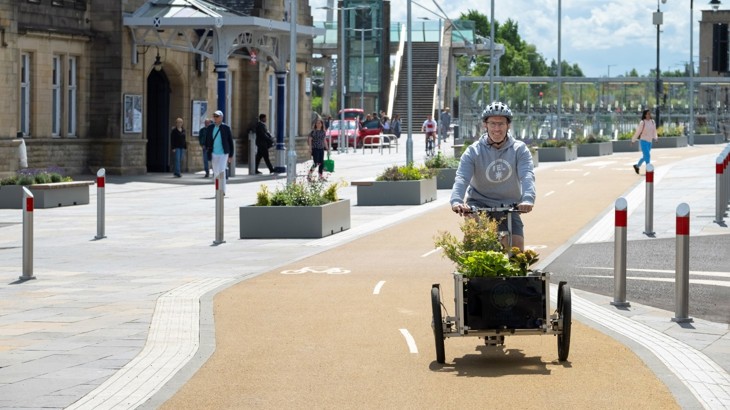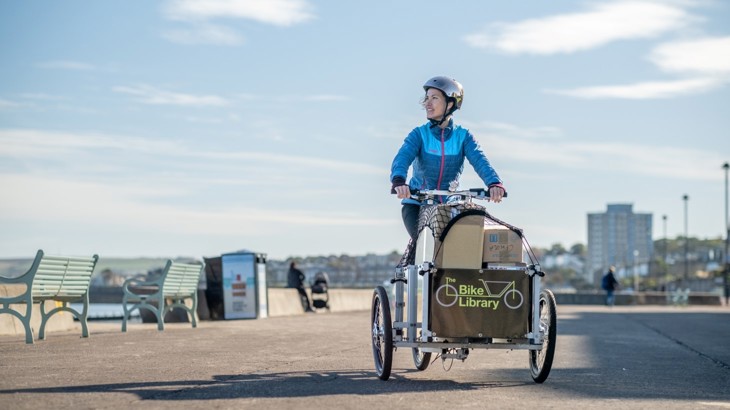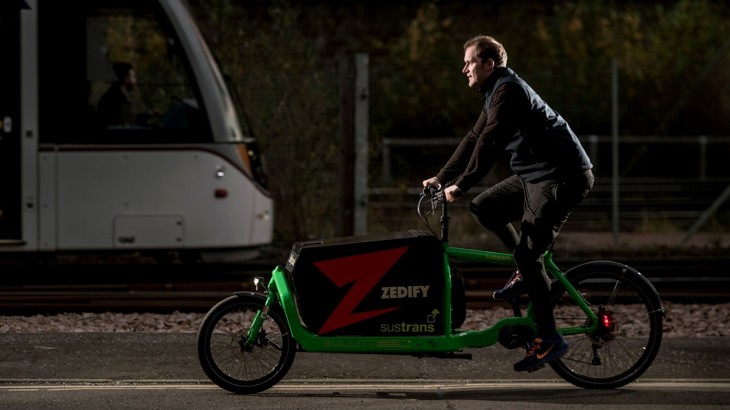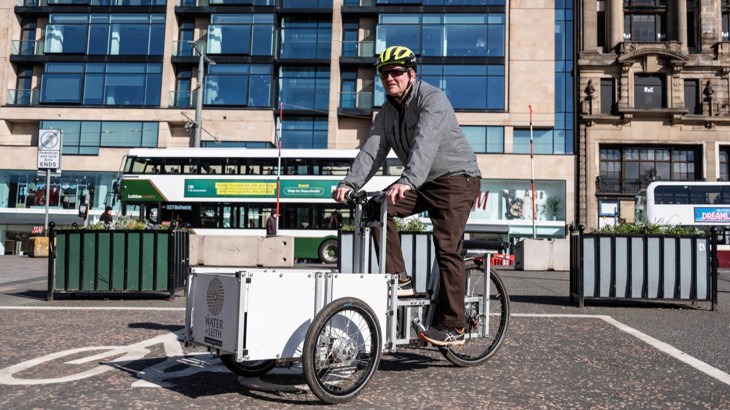Cargo bikes have the potential to revolutionise how we transport goods. Our latest research in Scotland looks at the barriers preventing widespread use of cargo bikes – and what can be done to overcome them.

While cargo bikes are increasing in popularity, there are barriers to widespread adoption. Credit: McAteer/Sustrans.
In Scotland, cargo bikes are starting to pop up in urban and rural areas, promising a cleaner, greener future for transport and local logistics.
But while they’re gaining traction, barriers to their adoption remain.
A recent Sustrans study highlights the challenges faced by both commercial and private users in Scotland, as well as the key solutions needed to encourage wider uptake.
Why cargo bikes matter
Scotland has ambitious goals for cutting carbon emissions, and as a major contributor, the transport sector will need to undergo significant change.
With the emissions from light goods vehicles, such as vans, increasing in Scotland by up to 25% in recent years, it is thought that cargo bikes (and their electric counterparts, e-cargo bikes) offer an elegant solution to cutting emissions in the transportation of freight.
Cargo bikes are compact, quiet, and capable of hauling up to 200kg, making them perfect for urban deliveries.
However, despite their potential, uptake by both businesses and the public remains slow.
Our research
A literature review examined the use of cargo bikes, and any reported challenges, across the UK and Europe.
Following this, interviews were held with eleven small to medium-sized businesses and organisations based across Scotland.
These interviews aimed to explore the barriers identified in the literature review and uncover challenges specific to cargo bike use in Scotland.

Sustrans' research explored the benefits and challenges experienced by cargo bike users in Scotland. Credit: Michael Kelly/Sustrans.
The barriers
Whilst all interviewees shared positive experiences of using cargo bikes, they also highlighted key barriers.
These were categorised into five themes:
1. Cost and funding
Cargo bikes are a considerable outlay for both well-established businesses and new ventures alike, with prices often rivaling second-hand vans.
While grants and loans exist, many businesses find them too bureaucratic or limited in scope.
2. Infrastructure
Most bike lanes aren’t designed with cargo bikes in mind.
Narrow paths and poorly thought-out barriers force riders to mix with road traffic.
3. Training and awareness
Many businesses and individuals are not aware of the potential of cargo bikes or don’t know where to start with incorporating them into their operations.
Additionally, as cargo bikes handle differently from traditional bikes, proper training is required but hard to come by in all regions.
4. Storage and security
Storage solutions are scarce, especially in urban areas.
Finding a safe spot to park a cargo bike overnight isn’t as simple as locking up a regular bike or even parking a van on the street.
5. Insurance and maintenance
Insuring a cargo bike as a commercial vehicle was found to be difficult and costly as the lack of choice in providers results in high premiums.
In addition to this, finding mechanics capable of servicing these unique bikes adds another complication in maintaining an operational fleet of commercial vehicles.
Faced with these challenges, it is only highly motivated businesses or organisations who persevere and are able to reap the benefits of using cargo bikes.

Infrastructure, storage and insurance are among the common barriers limiting cargo bike uptake in Scotland. Credit: Malcolm Cochrane/Sustrans.
The solutions
The interviews also offered a chance to identify the potential solutions that could make the use of cargo bikes more attractive to a wider range of users across Scotland.
Some of the solutions discussed have similarities with the solutions for increasing levels of active travel more generally, including:
Infrastructure upgrades: Design cycle paths wide enough for cargo bikes and add charging stations to facilitate longer e-cargo bike journeys.
Improved storage: Introduce secure parking bays and bike hangers in residential and commercial areas.
Other solutions that emerged build upon previously available support accessed by interview participants, such as the ebike Loan administered by Energy Saving Trust and the Cargo Bike Library project previously run by Sustrans Scotland:
Streamlined funding: Simplifying grant applications by expanding eligibility to newer businesses and making the application process more accessible.
Support networks: Create knowledge hubs where businesses can exchange information about reliable insurers or mechanics.

The research offers 5 solutions for cargo bikes to change the game on local logistics. Credit: Brian Sweeney/Sustrans.
Interviewees also recognised that a wider uptake of cargo bikes in Scotland would help alleviate some of these barriers.
Whether that be improved driver attitudes to larger cycles on the road, improved insurance offers driven by a larger client base, or an improved second hand market driving down costs.
But without the correct support and incentivisation it is feared this greater adoption of cargo bikes will not take place.
As such, one more solution emerged from the research:
Awareness campaigns: Promote the use of cargo bikes as viable alternatives to cars and vans for small businesses and organisations.
The future of cargo bikes in Scotland
As an emergent and disruptive piece of technology, cargo bikes offer the opportunity to re-imagine the urban freight sector.
In doing so they can play a large role on our journey to net-zero.
They also make where we live safer, cleaner and more people friendly.
But for this to happen, we need to break down the barriers and build a supportive ecosystem for cargo bikes to be widely used.
By identifying the challenges faced by early adopters of cargo bikes and presenting key solutions, our research aims to provide a clearer roadmap for expanding cargo bike use across Scotland.






